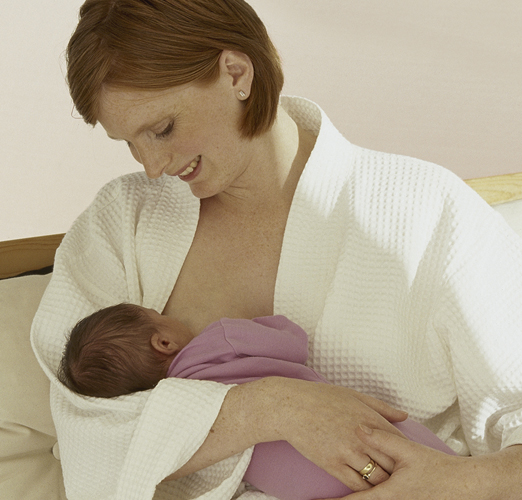What is colic?
The definition of
colic is uncontrollable crying in an otherwise healthy baby. To be
colicky has been defined as crying for more than three hours a day, for
more than three days in any one week. Although colic can occur at any
time of the day, it is more common between six in the evening and
midnight and is traditionally worse at around three months of age.
Unfortunately, around 10 percent of babies suffer with colic of varying
degrees. There are several theories as to what colic is, why it happens,
and the courses of treatment. It is more common in boys, bottle-fed
babies, and in first-borns, and it generally starts at around two to
four weeks and can continue for as long as three months. If it has not
settled by five months, you should see your doctor. For the very
unlucky, it can continue for six to nine months.
Living with colic:
Dealing with a colicky baby can be exhausting and upsetting. Keep reminding yourself that it will pass eventually.
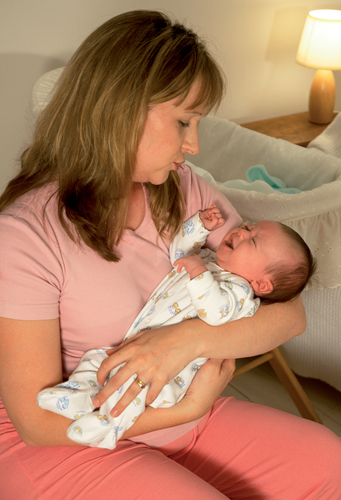
NOTE
Attending to your
own needs is good parenting. If it all gets too much, put your baby in
her crib and take a five-minute breather
NOTE
Learn to trust and
follow your instincts. These are often just right and are the signposts
that guide you on this unfamiliar journey
NOTE
A man's natural instinct may be to hold back and let someone else pick up the baby, so be inclusive when caring for your baby
Safe sleeping and SIDS Protecting your baby
There has been much
research into sudden infant death syndrome (SIDS), or crib death, to try
to find out why babies unexpectedly die. Several simple measures can be
taken to reduce the risk.
| Q: |
How can I reduce the risks?
|
| A: |
The American Academy of Pediatrics and the CDC suggest the following:
Don't let anyone smoke near your baby. Do not smoke during your pregnancy, and encourage your partner not to smoke. Place your baby on her back to sleep (and not on the front or side). Do not let your baby get too hot, and keep your baby's head uncovered. Place your baby with her feet to the foot of the crib, to prevent her wriggling under the covers. Never sleep with your baby on a sofa or chair. The safest place for your baby to sleep is in a crib in your room for the first six months. Settling
your baby to sleep (day and night) with a pacifier can reduce the risk
of crib death, even if the pacifier falls out while your baby is asleep. Breast-feed your baby. (Establish breast-feeding before starting to use a pacifier.) If
you do take your baby into your bed, be aware that it is dangerous for
your baby if you (or your partner) smoke, even if you never smoke in bed
or at home; have been drinking alcohol; have taken medication or drugs
that make you drowsy; feel very tired; if your baby was born before 37
weeks; weighed less than 5 lb (2.5 kg) at birth; or is less than three
months old. Also, accidents can happen: you might roll over and
suffocate her; your baby could get caught between the wall and the bed;
or could roll out and be injured.
|
Light cotton sheets and blankets, or a suitably sized baby
sleeping bag, are sufficient bedding for a small baby, preventing her
from becoming overheated. If you feel she is too hot or too cold, you
can take away or add a layer as necessary.
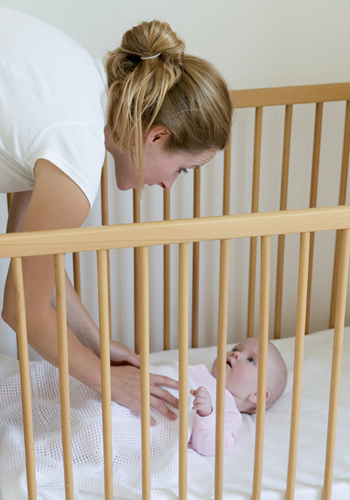
Placing your baby in a “feet to foot” position, with her feet at
the bottom of the crib, ensures that she will not wriggle down under her
blanket during the night and therefore reduces the risk of suffocation.
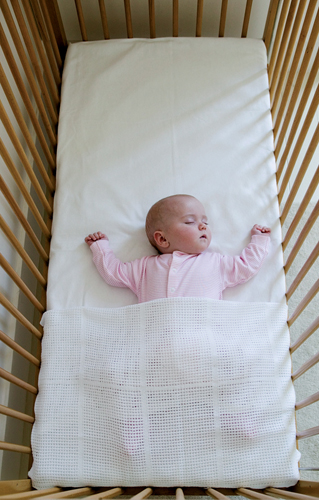
Sleeping and routines How patterns emerge
In the early weeks, there
is unlikely to be any set pattern to your days. Feeding on demand helps
to establish successful breast-feeding, so it is best to simply “go with
the flow” at this stage. By around six weeks, patterns will start to
emerge, and you can think about introducing some routines.
| Q: |
Can I introduce a routine from the start?
|
| A: |
One school of thought is to impose a strict routine of
four-hourly feeding. However, this is not the ideal way to establish
breast-feeding. Your baby has a small stomach and needs to feed “little
and often.” As she sucks, your breasts are stimulated into making more
milk—so feeding on demand boosts your milk supply. Equally, in these
early days, there is no structured sleep pattern—so it really is too
early to impose any sort of routine.
|
| Q: |
When should I consider a routine?
|
| A: |
By about six weeks, you will see a broad pattern emerging in
which your baby will probably feed longer and sleep longer at night. You
can start to help your baby become a good sleeper during the night, for
example by teaching her the difference between night and day,
encouraging her to be more active during the day, and by responding to
night wakings with minimal fuss in a darkened room, which will encourage
her to settle herself back down to sleep.
|
| Q: |
What should a routine consist of?
|
| A: |
Regular times for playing, feeding, and sleeping can be
beneficial for you both. A pre-bedtime routine could include a warm
bath, a massage, a feeding, and then putting your baby into the crib
drowsy but awake. You don't need to be rigid, but try to follow the same
sequence each evening.
|
Waking in the night:
When your baby wakes in the night, quietly see to her needs, then put her back down with as little fuss as possible.
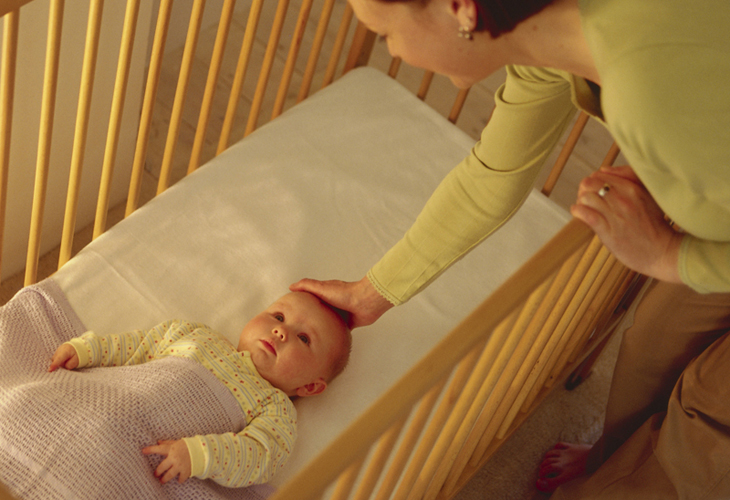
An evening bath can become part of your baby's bedtime routine.
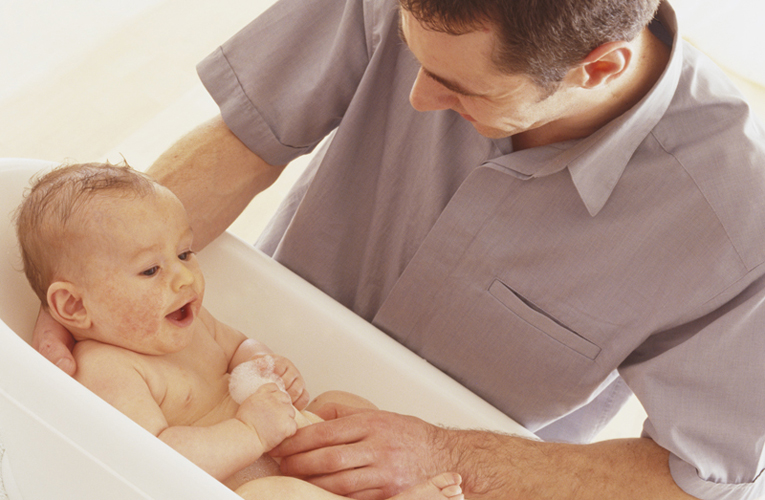
Once your baby is changed and ready to be put down, a bedtime feeding will help her settle down contentedly.
